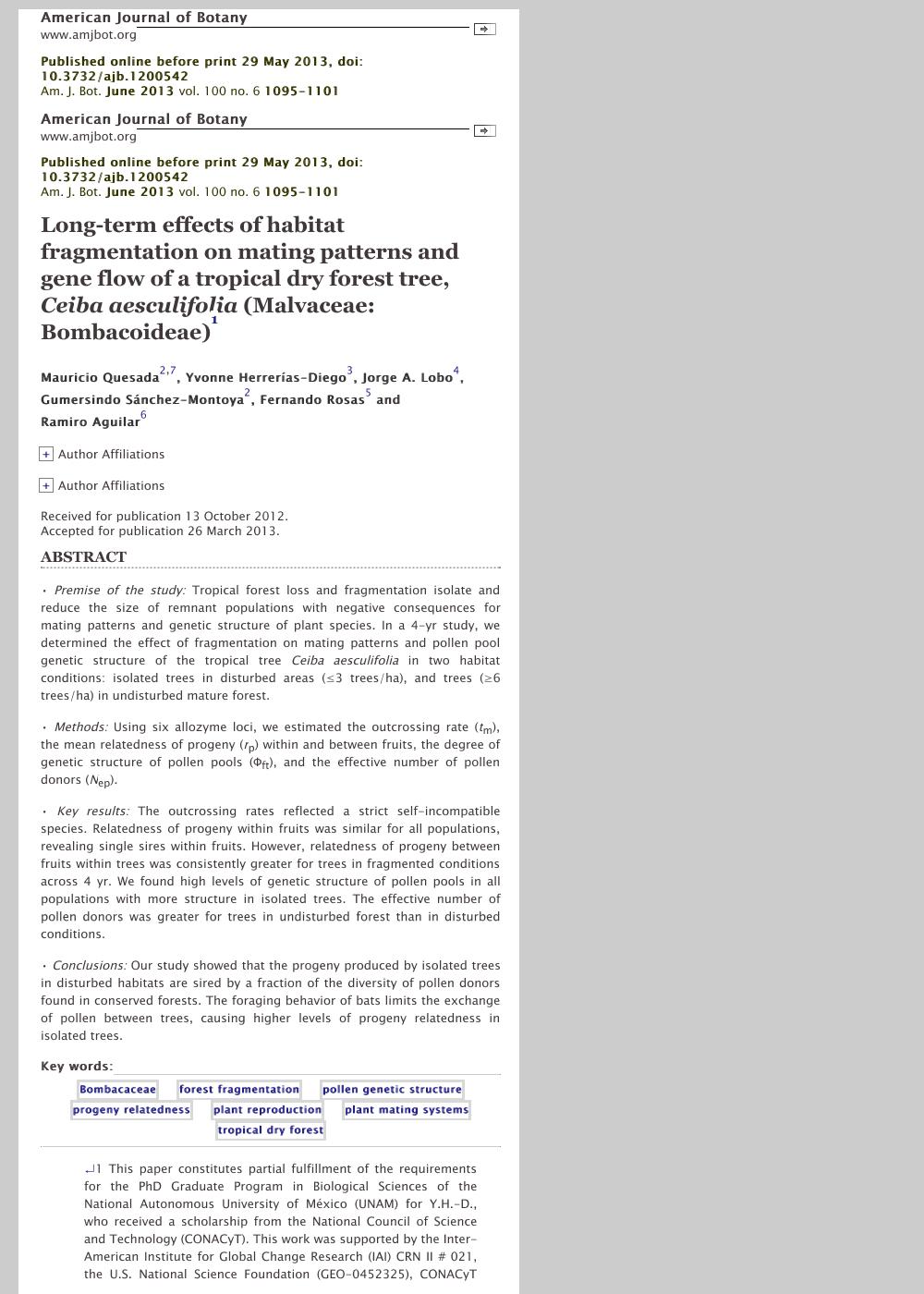Mostrar el registro sencillo del ítem
dc.contributor.author
Quesada, Mauricio
dc.contributor.author
Herrerias Diego, Yvonne
dc.contributor.author
Lobo, Jorge
dc.contributor.author
Sanchez Montoya, Gumersindo
dc.contributor.author
Aguilar, Ramiro

dc.date.available
2015-07-27T15:24:34Z
dc.date.issued
2013-06
dc.identifier.citation
Quesada, Mauricio; Herrerias Diego, Yvonne; Lobo, Jorge; Sanchez Montoya, Gumersindo; Aguilar, Ramiro; Long-term effects of habitat fragmentation on mating patterns and gene flow of a tropical dry forest tree, Ceiba aesculifolia (Malvaceae: Bombacoideae); Botanical Society of America; American Journal of Botany; 100; 6; 6-2013; 1095-1101
dc.identifier.issn
0002-9122
dc.identifier.uri
http://hdl.handle.net/11336/1510
dc.description.abstract
Premise of the study: Tropical forest loss and fragmentation isolate and reduce the size of remnant populations with negative consequences for mating patterns and genetic structure of plant species. In a 4-yr study, we determined the effect of fragmentation on mating patterns and pollen pool genetic structure of the tropical tree Ceiba aesculifolia in two habitat conditions: isolated trees in disturbed areas (<3 trees/ha), and trees (>6 trees/ha) in undisturbed mature forest. Methods: Using six allozyme loci, we estimated the outcrossing rate (tm), the mean relatedness of progeny (rp) within and between fruits, the degree of genetic structure of pollen pools (Oft), and the effective number of pollen donors (Nep). Key results: The outcrossing rates reflected a strict self-incompatible species. Relatedness of progeny within fruits was similar for all populations, revealing single sires within fruits. However, relatedness of progeny between fruits within trees was consistently greater for trees in fragmented conditions across 4 yr. We found high levels of genetic structure of pollen pools in all populations with more structure in isolated trees. The effective number of pollen donors was greater for trees in undisturbed forest than in disturbed conditions. Conclusions: Our study showed that the progeny produced by isolated trees in disturbed habitats are sired by a fraction of the diversity of pollen donors found in conserved forests. The foraging behavior of bats limits the exchange of pollen between trees, causing higher levels of progeny relatedness in isolated trees.
dc.format
application/pdf
dc.language.iso
eng
dc.publisher
Botanical Society of America

dc.rights
info:eu-repo/semantics/openAccess
dc.rights.uri
https://creativecommons.org/licenses/by-nc-sa/2.5/ar/
dc.subject
BOMBACACEAE
dc.subject
FOREST FRAGMENTATION
dc.subject
PLANT MATING SYSTEMS
dc.subject
PLANT REPRODUCTION
dc.subject
POLLEN GENETIC STRUCTURE
dc.subject
PROGENY RELATEDNESS
dc.subject
TROPICAL DRY FOREST
dc.subject.classification
Ecología

dc.subject.classification
Ciencias Biológicas

dc.subject.classification
CIENCIAS NATURALES Y EXACTAS

dc.title
Long-term effects of habitat fragmentation on mating patterns and gene flow of a tropical dry forest tree, Ceiba aesculifolia (Malvaceae: Bombacoideae)
dc.type
info:eu-repo/semantics/article
dc.type
info:ar-repo/semantics/artículo
dc.type
info:eu-repo/semantics/publishedVersion
dc.date.updated
2016-03-30 10:35:44.97925-03
dc.journal.volume
100
dc.journal.number
6
dc.journal.pagination
1095-1101
dc.journal.pais
Estados Unidos

dc.conicet.avisoEditorial
PMID: 23720432 [PubMed - indexed for MEDLINE] Free full text
dc.description.fil
Fil: Quesada, Mauricio. Universidad Nacional Autónoma de México; México
dc.description.fil
Fil: Herrerias Diego, Yvonne. Universidad Nacional Autónoma de México;
dc.description.fil
Fil: Lobo, Jorge. Universidad de Costa Rica; Costa Rica;
dc.description.fil
Fil: Sanchez Montoya, Gumersindo. Universidad Nacional Autónoma de México; México
dc.description.fil
Fil: Aguilar, Ramiro. Consejo Nacional de Investigaciones Científicas y Técnicas. Centro Científico Tecnológico Conicet - Córdoba. Instituto Multidisciplinario de Biología Vegetal. Universidad Nacional de Córdoba. Facultad de Ciencias Exactas Físicas y Naturales. Instituto Multidisciplinario de Biología Vegetal; Argentina
dc.journal.title
American Journal of Botany

dc.relation.alternativeid
info:eu-repo/semantics/altIdentifier/doi/http://dx.doi.org/10.3732/ajb.1200542
dc.relation.alternativeid
info:eu-repo/semantics/altIdentifier/url/http://www.amjbot.org
Archivos asociados
